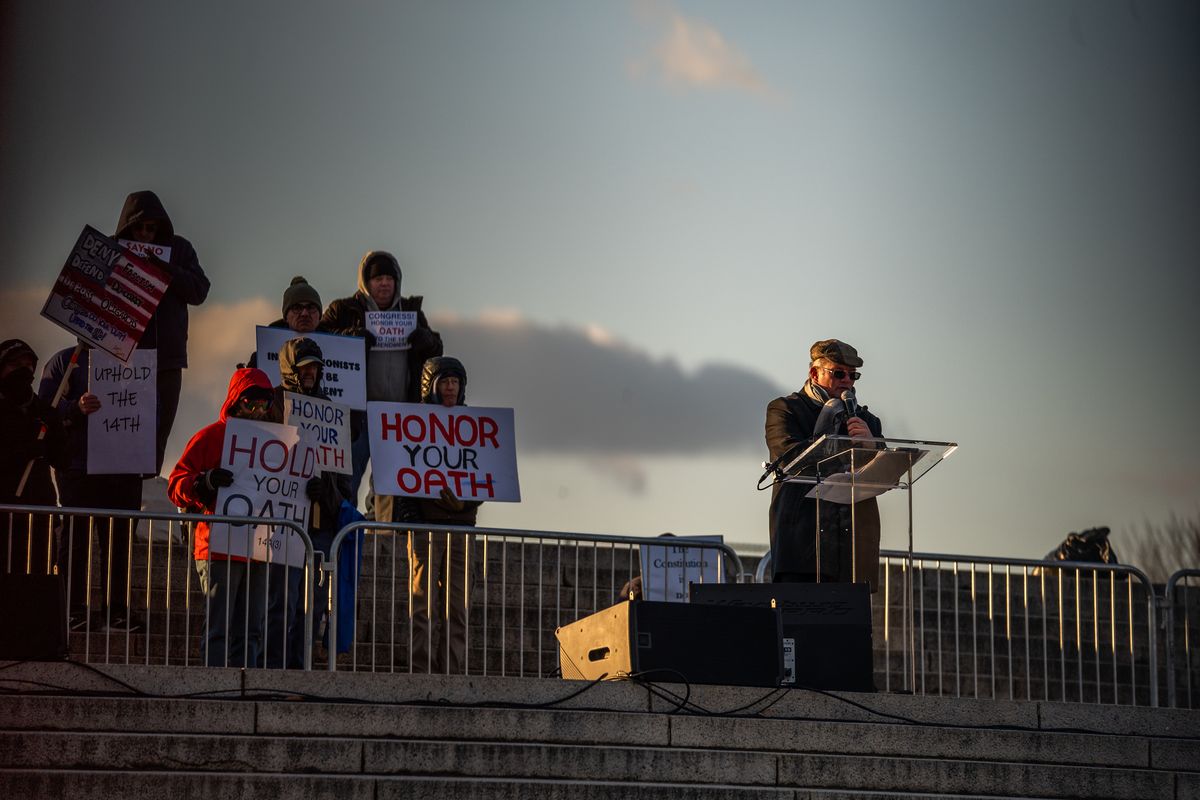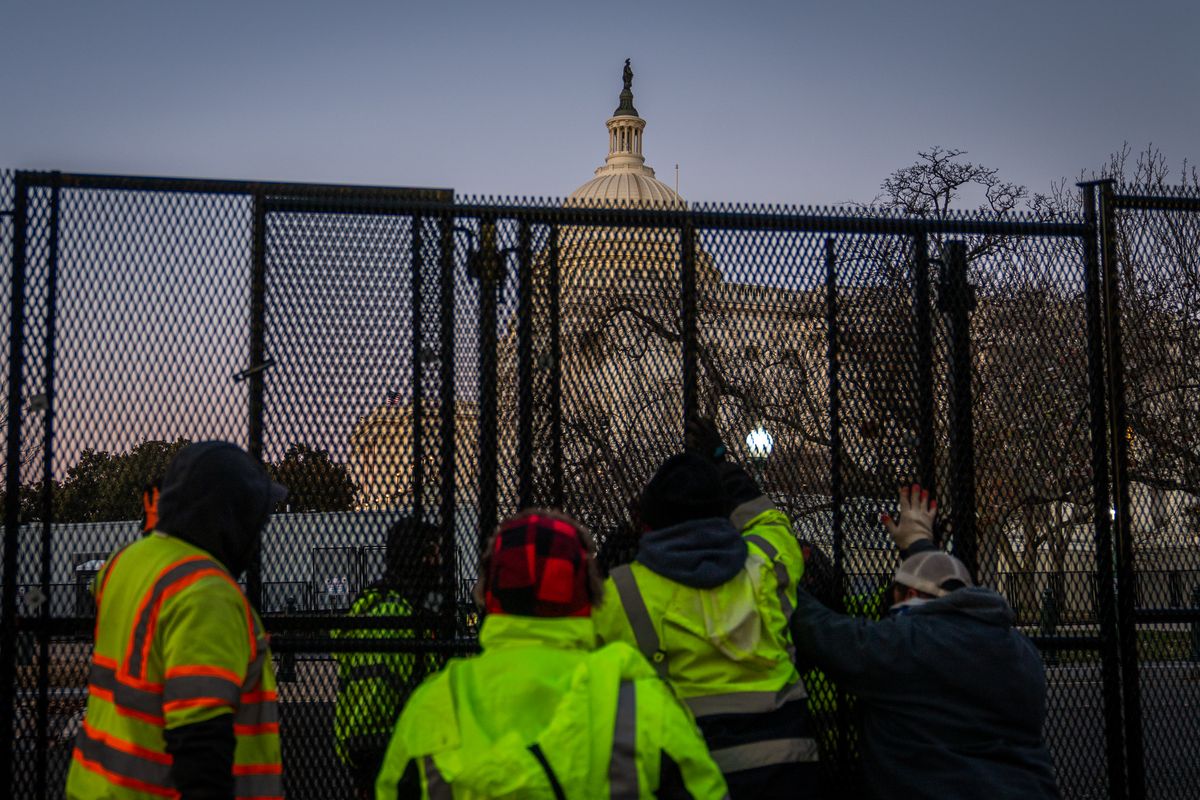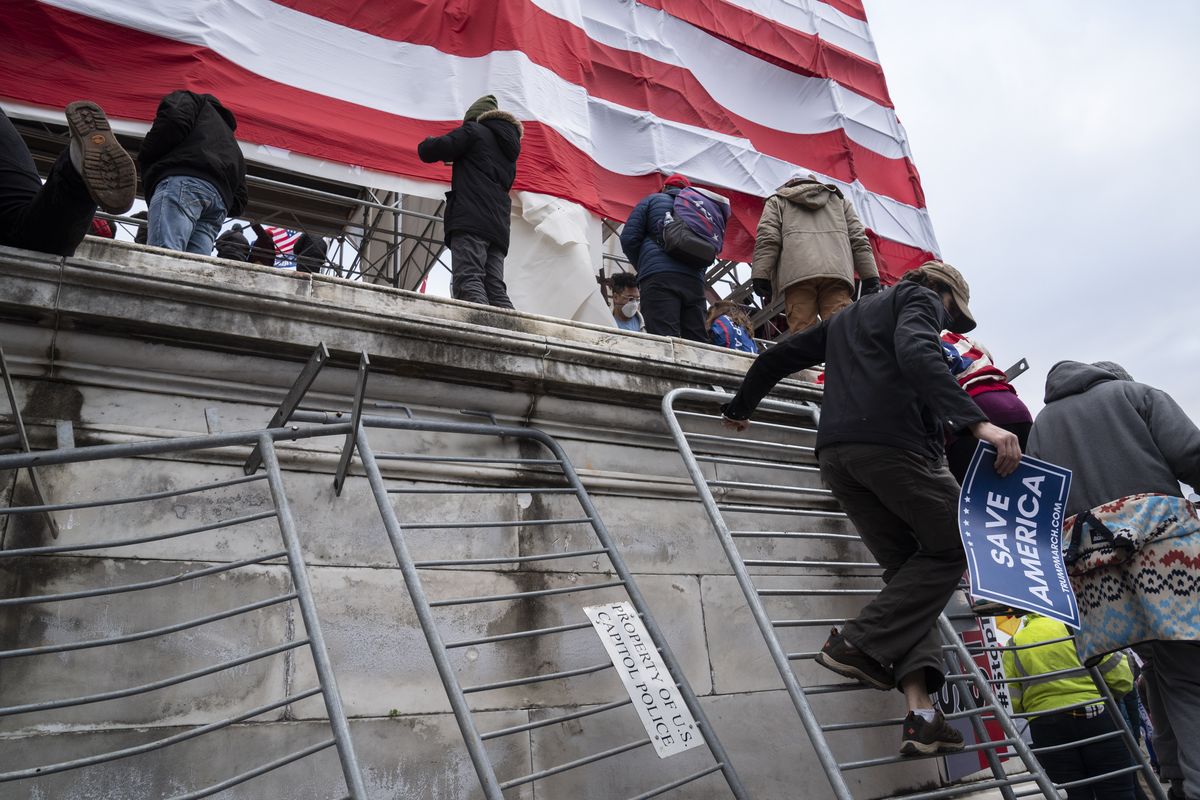As Jan. 6 anniversary approaches, Washington prepares, remembers
Workers install fences outside the U.S. Capitol on Saturday. (Allison Robbert/For The Washington Post)
The black security fences are up again. Local and federal law enforcement agencies have been placed on full alert. Five-hundred soldiers with the D.C. National Guard stand ready to assist if called.
If the preparations are any indication, the certifying of the presidential election at the U.S. Capitol on Monday will not be a repeat of Jan. 6, 2021.
That afternoon, the United States and much of the world watched in horror as the nation’s seat of power was overwhelmed by a violent mob of Donald Trump supporters intent on overturning Joe Biden’s election. Thousands of men and women swarmed through the Capitol and its grounds, some attacking police officers, smashing windows, trashing offices and threatening to hang Vice President Mike Pence, who had refused Trump’s entreaties to not certify the election results.
Four years later, the vivid memories of the attack on the Capitol may have faded in the minds of many Americans. But for those caught in the direct wake of Jan. 6, it remains a day marked by both fear and heroism, by despair for the country as well as determination that the attack not define it.
As the anniversary approaches, Henry Connelly, who was in the Capitol during the insurrection, says he is angered and saddened by what took place that day and the realization that it could have turned out much worse. But it also shaped him in an unexpected way.
“Overwhelmingly I have fond memories of the Capitol and what it felt like to walk into the building and that was maybe even strengthened by January 6th,” he said. “I was always proud to work there but I think I am prouder since.”
Connelly, then communications director for House Speaker Nancy Pelosi, D-Calif., huddled in silence on Jan. 6 with seven colleagues in a small conference room in her office. A young co-worker of his, who remembered active shooting drills she had learned in school, prepared to run or fight.
“We all felt threatened and scared,” said Connelly, 37, who has since left government and now works in the private sector. “You could hear them rampaging through the hallway, calling out for your boss, breaking down the doors on the other side of the hallway.”
Five people died as a result of the Capitol riot and more than 140 police officers were injured defending the building. Nearly 1,600 people have been charged in the riot, and more than 1,250 have been convicted.
Trump said last month that he will pardon those convicted of participating in the riot within minutes or hours of taking office. He did not specify how many people he would pardon but told Time magazine that “a vast majority of them should not be in jail.”
For many of those living and working on Capitol Hill, the neighborhood surrounding the Capitol, the attack was personal and felt for months. Streets were closed. Helicopters circled overhead. Local parks were patrolled by troops.
On a recent January morning, the neighborhood’s sidewalks were dappled with joggers, parents pushing strollers, people heading to work.
Some pedestrians declined to discuss the events of Jan. 6 or provide their names. Some said they feared ruffling the feathers of their employers or attracting unwanted attention online. Others shrugged off questions with general exasperation at the state of the political climate.
A block from the Capitol, Christine Clapp walked her dog, Piper, home after meeting her husband for coffee. The longtime Capitol Hill resident remembers the fear that swallowed her neighborhood on Jan. 6 and the days that followed. And she’s frustrated there are leaders and others who have chosen to downplay the events of the day.
“The fact that some are viewing it as a benign situation is a real insult to the members and the staff and the police and to the surrounding community and D.C. and to the nation,” she said.
Clapp isn’t concerned about a riot happening this year. “I think the fact it’s Trump coming back makes this anniversary a bit more difficult, but after seeing the reaction to his election was peaceful, I’m not fearful there will be people coming up here with pitchforks when the transfer of power happens,” she said.
Above one front door on a neighborhood street hung a banner displaying an American flag with black block letters: “RESIST TRUMP.”
Vernon “Skip” Strobel II, a native Washingtonian, had the sign made for his brick home after Trump first took office in 2017.
“I guess we can take that sign down now,” he remembers his roommate saying after Biden won the 2020 election.
“No, we can’t,” replied Strobel, 73. “This man isn’t going away.”
Now, as the insurrection anniversary nears and Trump’s second inauguration approaches, Strobel says the banner will remain. He was glued to his TV that day in 2021, as the mob stormed the Capitol, a mile from his home.
Later that afternoon, he ventured down to take in the sight with his own eyes. He says the Capitol lawn feels like an extension of his backyard, a cherished place to read a book. That day, it was in ruins. He remembers the yelling, the flags, the broken glass and barriers.
A retired federal employee and the son of a D.C. firefighter, he held back tears recounting the scene.
“It’s my hometown that people were trashing and defacing,” he said. “It just so happens to also be the nation’s capital city.”
The Jan. 6 anniversary is always difficult for Craig Sicknick, the oldest brother of Capitol Police officer Brian D. Sicknick, who died on Jan. 7, 2021, after fighting off Capitol insurgents the day before.
This year the day will be tough for two reasons.
“One is, well, my brother’s not coming back,” he said in an interview from his Spotswood, New Jersey, home. Secondly, he says the country itself is “possibly irreparably damaged” by electing Trump a second time.
Sicknick is outraged that Trump has said he will pardon those convicted for crimes on Jan. 6, including potentially the two men who attacked his brother. One was sentenced to seven years in prison, the other to five months for attacking Sicknick and other officers with chemical spray.
“It’s inexcusable. These people broke the law,” he said. “Basically, you’re saying the justice system has no meaning.”
For Sicknick, there is no question that Trump encouraged his supporters to go to the Capitol and did nothing to stop their assault until well after much of the damage had been done.
The Washington Post reported in 2022 that during the attack, Trump watched television, criticized Pence and made calls pushing lawmakers to overturn the election as his supporters ransacked the Capitol. Later that afternoon, he made a video urging his supporters to go home.
“We had an election that was stolen from us. It was a landslide election and everyone knows it, especially the other side,” Trump said in the recorded video from the White House. “But you have to go home now. We have to have peace. We have to have law and order.”
Sicknick says that Trump’s actions that day qualify as leading an insurrection, and because of that, his return to the White House is unconstitutional. On Saturday afternoon, he traveled to the District to share that message at a rally on the steps of the Lincoln Memorial.
But on Monday, he plans to retreat, temporarily, from his battle over Trump’s fitness for office and instead find time for himself.
“I think I’m going to turn off all news sources,” he said, “take the day off, and maybe go for a nice long walk in the woods.”
- – -
Ellie Silverman contributed to this report.



